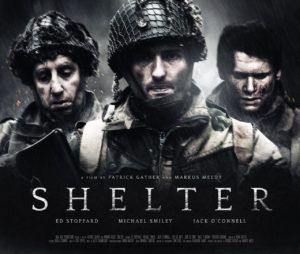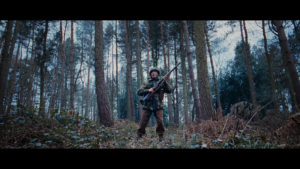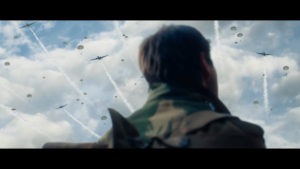
Short Film Review “Shelter”
WATCH THE FILM HERE
First, the Recap:
The pressure of tense circumstances. When our backs are to the wall, it is only natural that the inherent “fight or flight” mentality rules the day. Ascertaining which option is best will solely be determined by one’s own sense of self-preservation. Yet, what happens when confronted by such a situation when your personal well being is not the only thing in the balance? It is 1944, the Netherlands in the heart of WWII, and three British paratroopers–Corporal Arthur Boleyn (Ed Stoppard), Lance Corporal Frank Ainsworth (Michael Smiley), and Private Charlie Miller (Jack O’Connell)–find themselves in the core of a German ambush that decimates their company, leaving the three haggard, shell-shocked, and wounded men in a desperate search for a hiding spot.
Happening upon a quaint rural home, the men strive to quickly discern whether it is safe for them to take shelter, finding the home occupied by a Dutch woman named Helena (Elka de Witt) and her daughter Anna (Jude de Bont), both of whom are more than initially frightened and leery of the three soldiers who storm their home. With Corporal Boleyn’s assurance that they mean no harm but are simply seeking aid for their wounds and a place to lay low, the group soon finds some semblance of peace, even though the general atmosphere remains tense. But, the unanticipated arrival of a German Officer, Franz (Matt Ray-Brown), and two soldiers threatens to undermine Boleyn and his men’s attempts to find further solace, ushering in a potentially fatal showdown.
Next, my Mind:
War in any form is never pretty, and the toll taken on those not directly involved can be even greater. But, in the midst of chaos, there can also be rare moments of basic civility, cessation of hostility (in attitude or otherwise), and mutually shared humanity between soldier and citizen, which very much takes center stage in this 17-minute short film effort from co-director/producer Markus Meedt and co-director/producer Patrick Gather. Addressing the horror of experiencing the carnage and fear the three men face as they find themselves behind enemy lines without any support, the narrative then takes a decidedly different turn in having them happen upon the two women’s home and encounter the subsequent tension then, albeit hesitant, trust they build while being cared for. It is this dichotomy in actions and demeanor amongst the characters involved which gives the story its primary punch, as how often would we wish such a pleasant and unexpected, unforced place of mutual aid, companionship, and general acknowledgement of each other AS people in need would occur, either in this context, or just within the mass amounts of hatred and anger we see in the world today? Here, such notions are then put to the test when the soldiers are faced with another possible hostile situation upon the arrival of the Germans, turning a place of respite into one of incarceration. Given a chance to escape, the weight of inner feelings towards their enemy and not being able to let go of such overt animosity towards them takes over, unleashing a chain of events that could end up destroying them all, including the innocents like Helena and Anna. The film’s finale is one potent exclamation point to events, and reminds the viewer very weightily about the concepts being explored. From a visual standpoint, the film is made via 35mm on old glass to make it have a more “classic” feel, which is accomplished with precision and finesse, and is very apropos for this style of story.
Stoppard leads the way in his role as Corporal Boleyn, a stout, dedicated soldier who knows what it is to lead men into to the heart of war and the ravages it brings. Suddenly stuck in a scenario not exactly planned for, his ability to keep it together, rally the other ambush survivors, and take them forward is highly commendable and the mark of a true leader. He also represents the larger voice of reason when his compatriot’s actions or decisions might be too rash and not thought out. Even as his guidance allows the men to establish the connection with Helena and Anna that’s needed to be rendered aid, while likewise exercising solid reasoning upon having to figure out how to help them escape the home once the German officer and troops arrive, Boleyn is then forced to face the ugliness of the human heart when it comes to abject resentment towards the enemy his friends possess, with the ramifications that follow despite his best efforts, and the final sobering, heartbreaking realizations in the aftermath. It’s a wonderfully enacted, intense performance, filled with a sincerity of emotion, and Stoppard truly nails it.
Smiley and O’Connell also do quite a solid job in their roles as Ainsworth and Miller, Bolelyn’s comrades and fellow troopers whose handling of their plight has to be tempered by their leader’s more rational thought processes. They are perhaps, whether out of panic or fear, a little overly gung ho about how to treat the state of affairs they’re in, but it is admittedly understandable since the traumatic engagement via the ambush has left them on edge and just wanting to be safe. While it finally appears they will settle in and down a bit once in the house, the volatility within them gets re-triggered when Franz and crew are in the picture, welling up and increasing the chances of a bad outcome. It’s adds such a study of conflicting mentalities vs. Boleyn’s, and is well portrayed throughout by Smiley and O’Connell.
De Witt and de Bont shine in a perfectly understated and quietly energetic way through their characters Helena and Anna, a mother and daughter who’d just as well prefer to be a million miles away from war as they are right in the middle of it once Boleyn and his men show up. There’s the immediate anxiety and alarm in seeing the soldiers and certainly it garners concern for their well-being until Boleyn is able to convince them they just need some medical attention and perhaps food and drink before moving on. Once this is made clear, they ease up enough to treat the men as non-threats, to the point of further protecting them when Franz arrives. Yet, as they then have to entertain the Nazi officer and his men while knowing about their other “guests”, the mettle both women have is tested. Their story is also one of regular people getting caught in the middle of harsh realities, and both actresses play upon this with poise.
Ray-Brown does an equally fine job as Franz, a no-nonsense yet seemingly gentlemanly Nazi officer who only wants to visit with the ladies and have the same kind of hospitality as the as yet unknown to him visitors only a wall’s thickness away. By the time events reveal themselves, we see there could be a chance Franz feels the same overall way about the situation as Boleyn, but whether better judgment will be able to win out over the absolutely ill will oozing out amongst the opposing soldiers is highly in question. It’s an impassioned moment played with an almost eerie quietness, and Ray-Brown really embodies the rigidity of the moment perfectly. Supporting turns are present in the film from Carsten Garbode, Al Gregg, and Richard Hulme as well. In total, with its dramatic tone, quick pacing, character-driven narrative, great acting, and moral lessons in hate vs. the heart, “Shelter” is a quality piece of indie short film entertainment that certainly deserves notice.
As always, this is all for our consideration and comment. Until next time, thank you for reading!




